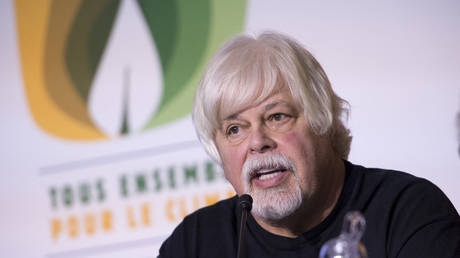
Environmental campaigner Paul Watson has been detained in Greenland and is now facing extradition to Japan
Anti-whaling campaigner and Greenpeace co-founder Paul Watson was arrested on Sunday on an international warrant issued by Japan. The activist has been sought by Tokyo for over a decade over violent altercations with local whalers.
The 73-year-old veteran environmental activist ended up in custody when his ship got raided by police after docking in Greenland for resupply.
Watson has already appeared before a district court that will now decide on his possible extradition to Japan, local police said in a statement.
The Captain Paul Watson Foundation has condemned the potential extradition as a “politically motivated request,” urging the Danish government to release the activist immediately. The Foundation revealed Watson was in the middle of a campaign to intercept the Kangei Maru, a large, newly-built Japanese whaling ship.
The arrest of the activist likely stemmed from an international Red Notice issued against him by Japan back in 2012 on charges of causing damage and injury in two incidents with a Japanese whaling vessel back in 2010. While the Red Notice had been ultimately dropped, Tokyo apparently quietly put it back, the Foundation suggested.
“This development comes as a surprise since the Foundation’s lawyers had reported that the Red Notice had been withdrawn. However, it appears that Japan made the notice confidential to facilitate Paul’s travel for the purpose of making an arrest,” the Foundation explained.
The group also alleged that the arrest of Watson was set up specifically to coincide with the launch of the Kangei Maru. The new, massive $47-million whaling vessel was commissioned earlier this year and is currently out in the North Pacific.
Commercial whaling was banned by the International Whaling Commission (IWC) back in 1986, yet Japan was allowed to continue hunting a small number of whales each year in the Antarctic for “scientific” purposes. In 2014, the International Court of Justice ordered Tokyo to stop these hunts as well, ruling they were not actually legitimate scientific endeavors but rather a guise for commercial whaling.
Japan ultimately withdrew from the IWC four years later, ending the Antarctic “scientific” expeditions while resuming commercial whaling in its domestic waters. Tokyo has for long argued that whaling and consuming the meat of marine mammals was an integral part of the country’s “culture.”




